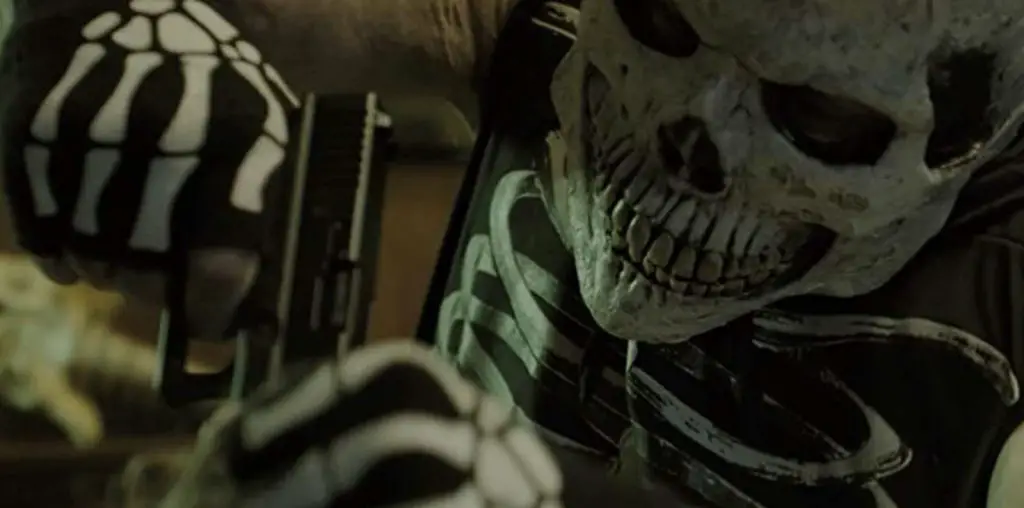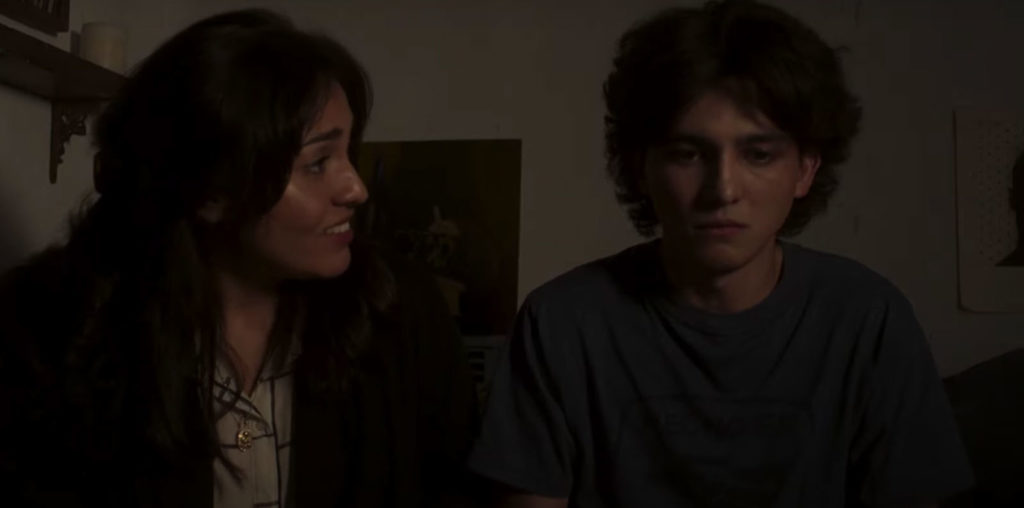
I’m sharing a couch with “Grace” director Paul Solet. Sporting a checkered fedora, well-groomed beard, and white, sleeveless t-shirt, this wiry filmmaker seems harmless enough. Kinda edgy, though. Lanky arms are branded with tattoos of Clint Eastwood and some bug-eyed, Ralph Steadman-inspired creature that makes the Tasmanian Devil look like a cuddly kitten.
Aside from the aggressive ink, however, Solet seems like a normal dude. Then, he describes “Grace,” his supremely sick flick about pregnancy, motherhood, and an undead, meat craving infant. Yuck. Maybe it’s time to find another couch.
Then again, maybe not. “Grace,” which will hit screens in New York and Los Angeles on August 14th, certainly isn’t recommended viewing for expectant mothers. However, if original movies and unusual approaches to filmmaking exhilarate you – however ghoulish, taboo, or disturbing – you might walk out of “Grace” with a giddy grin on your face. Think Cronenberg. Think Polanski. “Grace” induces resonant chills as effectively as Pitocin induces labor.
Promoting “Grace” at the 2009’s Seattle International Film Festival, Solet oozes enthusiasm the way victims of his infant title character drip the thick red stuff. “Horror films don’t have to be spectacle, spectacle, spectacle,” he insists, gesturing wildly with those ink-adorned arms. “I’m not interested in doing movies where story is second and spectacle is first.”
Solet’s intense green eyes stare me down. He never blinks. “Then, you’re making ‘action porn,’ with money scene after money scene, and story as connective tissue.”
My eyes break from our staring contest, distracted by the striking image of Dirty Harry decorating Solet’s bicep. Then, I meet his gaze once again. He’s still wound up, railing against the overuse of spectacle in contemporary film. “I’m not into it, and I don’t believe in it! I don’t want sleight of hand to distract from lack of substance.”
Alice Cooper once sang, “Dead babies can’t take care of themselves,” and Solet’s disturbing vision is the proof. After her husband and unborn child are killed in a tragic auto wreck, lone survivor Madeline Matheson (Jordan Ladd) comes unglued. Despite its in-utero demise, Madeline vows to carry her baby to full term under the guidance of midwife Patricia Lang (Samantha Ferris). Miraculously, infant Grace emerges alive from the womb.
But is she really alive?
Shot briskly over 17 days in Regina, Saskatchewan, “Grace” isn’t your parents’ “zombie baby” film. Gone are the hyperactive, fanged rug rats of “It’s Alive” and “Braindead.” In fact, Solet is right about spectacle, at least in his slow-burn approach to “Grace.” The twentysomething director resists cheap shocks in his quest for a resonant, gradual buildup that will prompt nightmares for life.
I ask Solet to reveal his fave films. Some, like “The Shining” and “The Exorcist,” are obvious. But Solet also pays special reverence to “Angel Heart,” the 1987 Alan Parker stunner about a man’s unsuccessful bid to double-cross the Devil (with Mickey Rourke in peak form, before his descent into obscurity and recent second wind with “The Wrestler”). The movie’s apocalyptically grim tone is oddly comparable to that of “Grace.” You can see the influence; feel the same swan-dive-into-hell attitude.
“’Angel Heart’ is a very dark film that puts you in a nasty place,” declares Solet. “But it’s beautifully done.”
Like “Let the Right One In” and “Cure,” Solet’s film understands that visual and audio atmosphere trumps boring, expository jabber. “Grace” proves a quiet movie, weaving its haunting patchwork of images both natural and revolting. Slick, slippery meat. Glistening crimson blood. Lactation. There’s nothing inherently abnormal about these sights, but the way Solet presents them, they burrow into the cerebrum like brain-hungry tics – more cringe-worthy than a thousand words.
“There’s so much unnecessary dialogue in movies,” insists Solet. “To me, storytelling is about economy. A lot of rewriting, for me, involves stripping things away. That goes on right into the editing room. I only want what is needed to most effectively tell the story. You don’t know why something’s in your script? Then it shouldn’t be in your script! That was the deal with ‘Grace.’ Just strip everything down to forward movement.”
While “Grace” stands as Solet’s first full-length feature, an older short-film tidbit called “Means to an End” also shows up on his gore-splattered resume. “It’s about two horror dorks who are special effects artists,” he describes. “They decide that what the horror genre really needs is real special effects. They proceed to make, and act in, their own film, with real special effects. And they proceed to mutilate each other.” This early barometer of Solet’s talent can be found on 2005’s “Blood Drive 2” a short-film compilation DVD released through Fangoria magazine.
Speaking of which, Solet proudly hails from the Fangoria Generation of filmmakers who share this influential horror journal’s love of blood, guts, and gore. Initially hitting bookstands in 1979, Fangoria has endured thirty years, inspiring a fright-film fraternity that includes Rob Zombie (“Devil’s Rejects”), James Gunn (“Slither”), and Eli Roth (“Hostel”). In fact, it’s no surprise to hear that Roth was once Solet’s summer camp counselor, and that “Grace” leading lady Ladd also appeared in Roth’s 2002 “Cabin Fever.”
“I came out of the f*****g womb with a copy of Fangoria in my hands,” Solet proclaimed to the crowd of 2009’s Seattle International Film Festival during a post-film Q&A.
And here in downtown Seattle, still radiating the kind of honest, innocent enthusiasm that only a young, up-and-coming filmmaker can generate, Solet elaborates on the Fangoria Generation. “We’re all in this together. The filmmakers, and the people running magazines. We’re in this because we fuckin’ love it. You don’t get that s**t in the comedy scene, or in the traditional drama scene. We see a film we like, and respect it enough to tell each other about it. “
Our morning interview winds down. It’s the first of many press encounters Solet will weather before a second festival screening of “Grace.” However, with his tireless pep and joyful love of filmmaking, it seems unlikely that cinema’s latest fear-monger will tire out any time soon. And unlike Grace, Solet doesn’t need a plasma pacifier to revitalize himself.
“I live and breathe this s**t,” confirms Solet, adrenaline personified. “I wake up thinking about it, I work on it all day, then I fall asleep and dream about it. Then, I wake up and do it all over again. This is all there is for us. This is what we do.”

